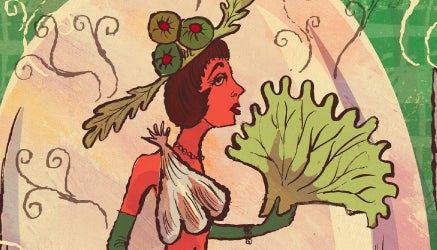When Food Smells Attack

Q: Whenever I eat asparagus, my urine has a funny smell. Why does that happen?
A: That’s sulfur you’re smelling. Asparagus contains a variety of sulfur-containing compounds, and they end up in your urine within a half hour after eating it. However, not everyone notices the sulfur odor. Due to what appears to be a genetic trait, some people can smell it, while others cannot.
Q: Is there any way to reduce garlic breath?
A: There are two ways: One is to not eat it. The other is to cook it.
If you hold a garlic knob up to your nose, you’ll notice that it has very little odor. Once you crush a garlic clove, however, the cell membranes break, releasing a natural antioxidant compound called allicin, which delivers garlic’s characteristic smell. It circulates in your blood and can give you garlic breath for a good 48 hours.
Because the garlic smell comes from your lungs rather than your mouth or hands, breath mints, gum, and brushing your teeth won’t remove it. You’ll find a similar effect from other foods in the allium familyonions, leeks, scallions, chives, etc. Cooking destroys some of the allicin, especially if you cook the garlic immediately after crushing it.
Q: My husband eats a lot of fish, and it seems to cause an odor in his skin. Is that possible?
A: Yes, it is. A study of Japanese men showed that, compared with Americans, their sweat glands secrete much more of a malodorous compound called 2-nonenal, which is believed to come from lifelong fish consumption.
A particularly strong smell comes from a chemical called trimethylamine. It is the smell of rotting fish and is produced by bacterial action. If you eat fish, the same decomposition process occurs in your digestive tract, as intestinal bacteria attack the fish muscle tissue. The trimethylamine passes into your bloodstream, and your liver rapidly converts it to much less malodorous compounds that are eventually excreted. However, some people eliminate trimethylamine much more slowly than others do, probably due to genetic differences in liver enzymes. For them, fish imparts a distinctive smell to perspiration, breath, urine, and bodily secretions.
Q: What can I do about gassiness?
A: Here’s everything you wanted to know about flatulence, but were afraid to ask:
Gas comes from two sources. Some is simply swallowed air. Your digestive tract absorbs most of the oxygen, leaving nitrogen and carbon dioxide. You can also swallow carbon dioxide in carbonated beverages.
The second source is bacterial fermentation. Just as yeast in a brewery produces bubbles in fermenting beer, bacteria in your digestive tract break down the foods you eat, producing carbon dioxide, hydrogen, and methane. All these gases are odorless.
What is not so innocuous is the smelly gas that comes from the bacterial breakdown of proteins, which releases sulfur and a “rotten egg” smell. This is apparently why gassiness from a cat or dog can be particularly malodorous (if they ate rice, it would be a different story).
A food that causes gassiness for one person may have much less effect on another person. The difference seems to be the sort of bacteria that inhabit your digestive tract. Some bacteria destroy the hydrogen produced by other bacteria, for example.
If beans or similar foods give you gas, have smaller portions, and be sure to cook them well. The same applies to cruciferous vegetables, such as broccoli or cabbage. Cooking makes them more digestible. Some people use Beano, a commercially produced enzyme that breaks down the natural starches in beans so that bacteria cannot ferment them. [Editor’s note: Beano is not vegetarian, but there is a vegan version called Bean-zyme.]
One cause of flatulence deserves special mention: lactose intolerance. Infants easily digest the natural sugars in breast milk, because they have lactase enzymes in their digestive tracts. After the age of weaning, these enzymes start to disappear. So milk sugar remains undigested and becomes fodder for intestinal bacteria, which eagerly ferment it, causing gas, indigestion, and cramps. The answer to lactose intolerance, of course, is to avoid milk, ice cream, and similar products, or to switch to nondairy versions, such as soymilk or rice milk.